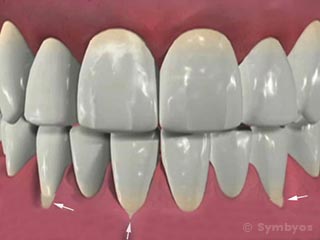Tooth sensitivity

Arrows show where receding gums have led to exposed tooth roots, which can be extremely sensitive. Often, receding gums are a sign of a larger problem—like a tooth grinding habit (bruxism), or teeth which are positioned in the dental arch such that the underlying supportive bone is very thin. When that happens, the bone can resorb, and the overlying soft tissue recedes.
Teeth that are generally very sensitive to extremes of temperature (especially cold), sweets, and touch (for example, with a fingernail) may be diagnosed with sensitive teeth (dentin hypersensitivity). This diagnosis may represent the symptoms of a larger problem, such as a tooth grinding habit (bruxism), which may have contributed to receding gums, severe wear on the teeth (attrition), or abfractions. Generally, sensitive teeth are a temporary situation, but bouts with sensitivity may re-occur, especially if the underlying cause is not identified and treated.
Sensitive teeth have one thing in common: exposed dentin. One situation in which this occurs is when the gums have receded and exposed the tooth’s root. Once the root is exposed, the thin cementum layer over the tooth root is worn away, exposing the underlying dentin. This is fairly common in patients who brush their teeth aggressively, or who frequently ingest acidic food and drink.
Another situation in which widespread dentin exposure occurs is when a patient grinds their teeth (bruxism). Once the enamel layer is perforated, the underlying dentin is exposed. If a person habitually clenches their jaw muscles, it can cause stresses to concentrate near the gumline. Pieces of tooth enamel can fracture off in such areas, creating angular notches (abfractions).
Frequent exposure of the teeth to acids can erode tooth enamel in a characteristic rubbed down appearance, commonly seen on the inner surfaces of the upper front teeth of bulimic patients, and on the lower molars of some patients who suffer from gastroesophageal reflux disorder (GERD). Certain ethnic groups and individuals enjoy using lemon salts or other corrosive substances that can dissolve tooth enamel. If any of these cause dentin exposure, the patient can experience sensitive teeth.
Periodontal surgery to eliminate deep gum pockets around the teeth can cause exposed tooth roots. Generally this outcome is preferred to allowing gum pockets to remain, because patients are unable to effectively remove bacterial plaques more than four millimeters below the visible gumline. Nonetheless, the resulting sensitive teeth can be treated to make the patient more comfortable.
See also on ToothIQ.com